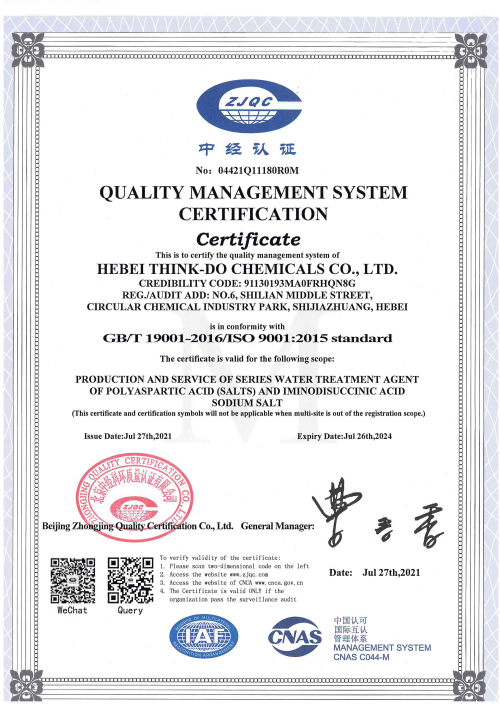
News
Αυγ . 09, 2024 00:20 Back to list
Comprehensive Guide to Popular OEM Chelating Agents for Industrial Applications and Their Uses
Understanding OEM Chelating Agents A Comprehensive Overview
In various industrial applications, particularly in the manufacturing and formulation of products, chelating agents play a crucial role. OEM (Original Equipment Manufacturer) chelating agents are specifically formulated to enhance the performance and stability of formulations across diverse fields such as agriculture, pharmaceuticals, and personal care products. This article explores the significance, varieties, and applications of these agents.
What Are Chelating Agents?
Chelating agents are molecules that can form multiple bonds with a single metal ion, effectively grabbing the metal and forming a stable complex. This process is known as chelation. The presence of chelating agents in formulations helps in detoxifying and stabilizing metal ions, which can otherwise catalyze unwanted reactions or cause degradation of the active ingredients.
Importance of OEM Chelating Agents
OEM chelating agents are tailored to meet specific requirements suited to different products. They are essential in preventing metal-induced instability, enhancing the solubility of active ingredients, and improving the efficacy of the formulation. The specific choice of chelating agent can significantly influence the product's performance, safety, and user experience.
Types of Chelating Agents
Several types of chelating agents are commonly used in OEM applications, each with distinctive properties and functionalities
1. Ethylenediaminetetraacetic Acid (EDTA) EDTA is one of the most widely used chelating agents known for its strong binding capabilities with a range of metal ions, including lead and mercury. Its effectiveness in various pH levels makes it a popular choice in both industrial and consumer products.
2. Citric Acid A natural chelating agent, citric acid is often used in food and cosmetic formulations. It not only chelates metals but also functions as a natural preservative, improving the overall safety and stability of products.
oem chelating agent list

3. Nitrilotriacetic Acid (NTA) Similar to EDTA, NTA is effective in binding divalent and trivalent metal ions. It has applications in cleaning products and water treatment, where metal removal is crucial.
4. Gluconic Acid This is a milder chelating agent derived from natural sources. It is often utilized in personal care products for its biocompatibility and effectiveness in binding calcium and magnesium ions.
5. Salicylic Acid Besides its chelation properties, salicylic acid is renowned for its dermatological benefits. It is extensively used in skincare products, particularly for treating acne, due to its ability to unclog pores and reduce inflammation.
Applications of OEM Chelating Agents
1. Agriculture In the agricultural sector, chelating agents enhance nutrient availability in soil, improving the uptake of essential metals like iron and zinc. This results in healthier crops and higher yields.
2. Pharmaceuticals and Personal Care In pharmaceuticals, chelating agents help stabilize active ingredients, prevent discoloration, and enhance the safety profile of products. In personal care, they assist in maintaining product integrity and improving skin compatibility.
3. Water Treatment Chelating agents are widely used in water treatment processes to remove heavy metals and improve water quality. They play a vital role in ensuring environmental safety and compliance with pollution controls.
4. Food Industry In food preservation, chelating agents help inhibit the growth of pathogens by binding to metal ions that support microbial growth, thus extending the shelf life of products.
Conclusion
OEM chelating agents are indispensable components in various industries, ensuring the safety, effectiveness, and stability of formulations. Selecting the appropriate chelating agent tailored to specific needs can significantly enhance product performance, making it vital for manufacturers to understand the diverse range of options available. The ongoing development and innovation in chelating agents will continue to shape the future of formulations across multiple sectors, reinforcing their importance in both everyday products and industrial applications.
-
Polyaspartic Acid Salts in Agricultural Fertilizers: A Sustainable Solution
NewsJul.21,2025
-
OEM Chelating Agent Preservative Supplier & Manufacturer High-Quality Customized Solutions
NewsJul.08,2025
-
OEM Potassium Chelating Agent Manufacturer - Custom Potassium Oxalate & Citrate Solutions
NewsJul.08,2025
-
OEM Pentasodium DTPA Chelating Agent Supplier & Manufacturer High Purity & Cost-Effective Solutions
NewsJul.08,2025
-
High-Efficiency Chelated Trace Elements Fertilizer Bulk Supplier & Manufacturer Quotes
NewsJul.07,2025
-
High Quality K Formation for a Chelating Agent – Reliable Manufacturer & Supplier
NewsJul.07,2025
